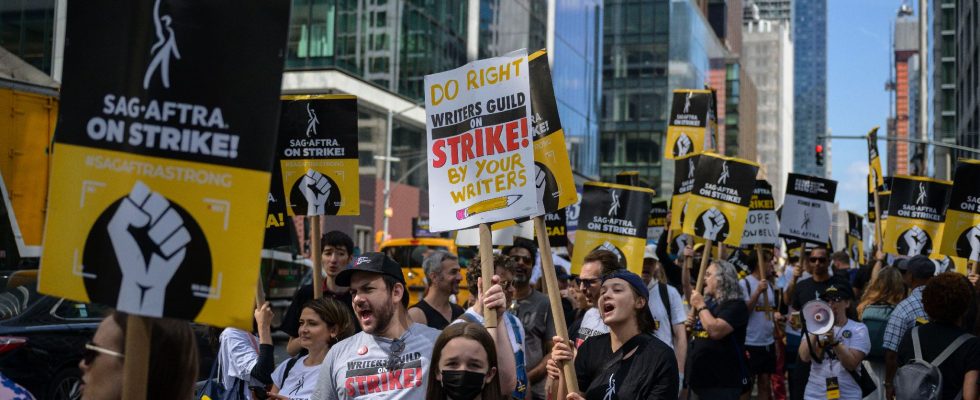The images have been on television around the world for almost four months now. In Hollywood, the tinsel of film sets has given way to anger and protest signs. Here, as in the rest of the United States, the production of series and films has come to a halt due to a major strike by screenwriters and some of the actors. These professionals are demanding an increase in remuneration, in particular vis-à-vis streaming platforms, as well as safeguards concerning the use of artificial intelligence for creation.
This movement, which has dragged on for almost 150 days, is beginning to have concrete impacts on the sector. Several blockbuster releases have already been postponed, such as the second part of the feature film Dunes or the next films of the Marvel franchise. Shootings are put on hold or postponed. A disruption of the calendar which could have significant consequences on our side of the Atlantic.
In France, American cinema directly funds its tricolor cousin, via cinema admissions. On each ticket, the National Cinema Center (CNC) takes 10.72% of the price, which it then redistributes to promote creation and support French production. This tax is paid directly into the public institution’s support fund, regardless of the nationality of the film screened in theatres. “The Americans were moved that this share did not come back to them when it was established in 1948”, recalls Frédéric Gimello-Mesplomb, lecturer in cinema economics at the University of Lorraine.
French films stalked
In 2022, the market share of American films in France was 40.5%, i.e. a total of 61.6 million admissions, barely less than French films (40.9% and 62.2 million admissions). ‘entries). Their show of force during the summer of 2023 was spectacular: in the top ten of the most popular films of recent weeks, nine were produced in the United States, including the boxes Barbie (5,555,615 spectators) and Oppenheimer (4,156,317 spectators). They remain essential to operate the tricolor machine. “French cinema has always been dependent on American cinema. Its financing system is based on it”, emphasizes Frédéric Gimello-Mesplomb.
In the sector, the time is not yet to worry. “From a structural point of view, this means fewer film releases or it leads to postponements, because they could not be shot. It is true that this will end up creating a traffic jam which could partially weaken the market. French. But fortunately, we are not completely dependent on the American offer”, wants to believe the director Jeanne Herry, co-president of the Civil Society of Authors, Directors and Producers (L’ARP).
“The strike should not last…”
French cinema, known throughout the world for its cultural exception, nevertheless finds itself in an ambivalent situation. French screenwriters have taken a stand for their American counterparts, and several associations, including ARP and the Society of Film Directors (SRF), have shown their support. “We are in total solidarity with the strikers in the United States. But if this continues, we will have to see with the CNC whether it is possible to put in place occasional support”, recognizes Rosalie Brun, general delegate of the SRF.
An extension of the movement would threaten the financing of French cinema. “The strike should not last until December because we will end up feeling it. It is really at the beginning of 2024 that we will start to see the problems”, anticipates Valérie Lépine-Karnik, general delegate of the Union of Cinema Producers.
For the time being, the CNC considers that “it is still a little early to comment on this question because the phenomenon of film lag is still marginal at this stage. There are still a lot of promising American films in the release calendar from here the end of the year.” Thomas Paris, economist at the CNRS, confirms, while not ruling out possible economic impacts: “We had a somewhat similar situation with the Covid which caused a stoppage of American outings, then a traffic jam, I don’t see the situation will get worse than that. There will be consequences, but not to the point where everything collapses.”
